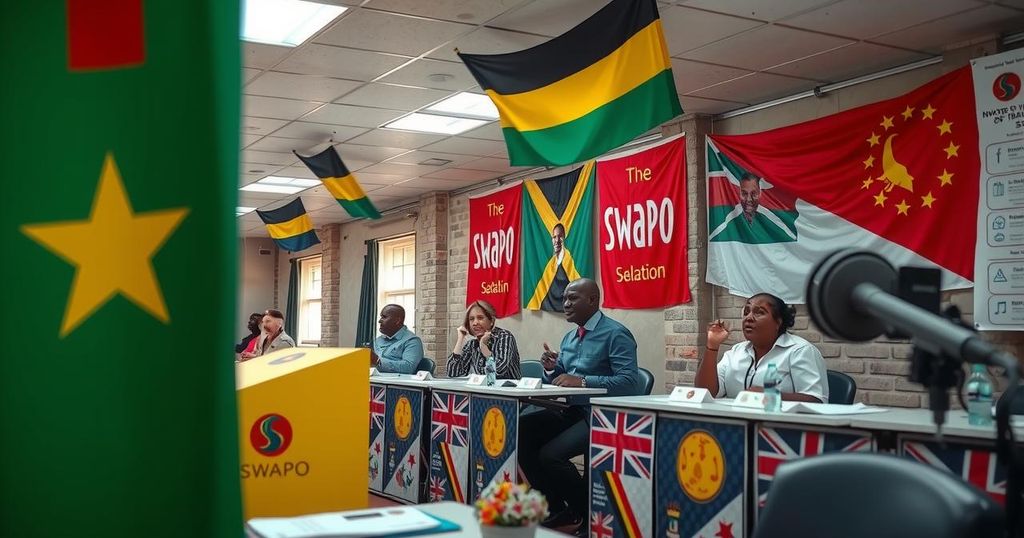Namibia Elections: Swapo Faces Electoral Setbacks Amidst Rising Opposition

Namibia’s ruling party Swapo has retained power amidst notable electoral losses, with candidate Netumbo Nandi-Ndaitwah winning the presidency at 57%. Opposition parties contest the results due to irregularities in the election process. This year has seen significant setbacks for incumbents across sub-Saharan Africa, driven by economic dissatisfaction and growing opposition coordination. Trends suggest a resilient democratic engagement in Africa in contrast to broader global issues.
Namibia’s ruling party, the South West Africa People’s Organization (Swapo), has successfully maintained its power for over three decades, yet the recent elections indicate a significant decline in its authority. The Swapo candidate, Netumbo Nandi-Ndaitwah, emerged victorious in the presidential election with 57% of the votes, marking her as the first female leader of the nation. Despite this win, opposition parties have contested the legitimacy of the election process, citing logistical issues and irregularities during voting. Additionally, Swapo faced its most severe performance in parliamentary elections, losing a significant number of seats while barely retaining its majority.
This year stands out for many governing parties across sub-Saharan Africa, as more incumbents faced severe electoral challenges. Notably, the Botswana Democratic Party (BDP), which has been in power since independence, experienced a seismic loss in the recent general elections, crashing from 38 seats to just four. Furthermore, in Mauritius, the ruling coalition’s performance plummeted, allowing the opposition Alliance du Changement to seize a sweeping majority with 60 of 66 parliamentary seats. The trend reveals that voters are increasingly dissatisfied with their governments amid economic downturns, public corruption, and better-organized opposition parties.
The situation in Senegal reflects similar sentiments as the main opposition leaders, who faced imprisonment prior to the elections, made significant gains after their release. The results came against a backdrop of government efforts to manipulate the political landscape, demonstrating fragile public trust in authority. While some governments retained power, they lost significant ground; South Africa’s African National Congress (ANC) dipped below the 50% threshold for the first time since 1994, necessitating coalition-building to maintain governance.
Beyond the immediate electoral outcomes, these political dynamics suggest an emerging pattern of active citizen engagement and increased demand for accountability. In response to economic frustration and a yearning for democratic governance, opposition parties have adopted new strategies to ensure electoral integrity. This momentum indicates that sub-Saharan Africa may witness a continuing trend towards competitive multiparty politics in the coming years, reflecting a resilience in democratic engagement despite broader global authoritarian movements.
As such, the political landscape of Africa should be regarded with a nuanced perspective, recognizing not only the challenges faced by ruling parties but also the potential for democratic restoration and evolution. The developments in countries like Namibia and Botswana highlight the shifting sands of political power, calling for a closer examination and appreciation of these dynamics in the context of global democratic resilience.
The context of political dynamics in sub-Saharan Africa has been marked by a significant electoral year in 2024, with incumbent parties experiencing unprecedented losses. The shifts in power, particularly evident in Namibia’s recent elections, signal a growing dissatisfaction among voters, emphasizing economic challenges and public discontent with corruption as primary drivers. Furthermore, opposition parties have demonstrated increased capability in contesting elections, reflecting changing attitudes and the political engagement of citizens. This environment contrasts starkly with regions facing authoritarian trends, highlighting a renaissance in democratic movements within Africa.
In conclusion, the recent electoral performances of ruling parties across sub-Saharan Africa, and particularly in Namibia, underscore a resounding shift towards greater accountability and responsiveness in governance. The growing efficacy of opposition parties, coupled with citizen demands for transparency and economic stability, sets the stage for further political upheaval, suggesting that the continent may experience profound transformations going forward. The resilience demonstrated amidst global authoritarianism indicates a robust capacity for democratic engagement among African nations.
Original Source: www.bbc.com







